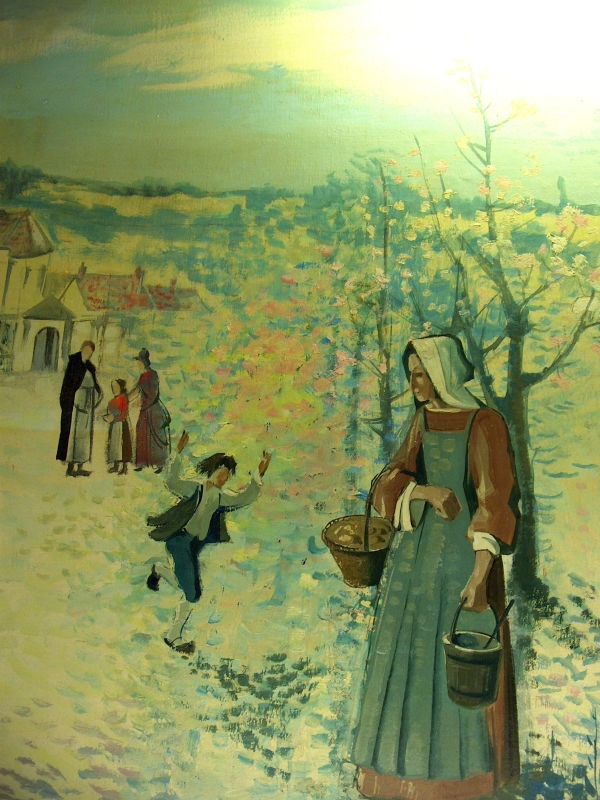“The spirit of poverty and the love of work” are Marie Poussepin’s last recommendations: “May the Community never degenerate on this point.” Our first sisters led a poor and laborious life, “without being different from the persons living in the world except for their piety and modesty of their dress.” Their poverty manifests itself by a great simplicity which, from the beginning, has characterized the Community. They hand-knit stockings to support themselves “simply, frugally, and without being a burden to anyone,” and to help the poor gratuitously, “seeking only the glory of God and the good of neighbor.”
Source: Original Vision (In the Constitutions)
 Charitable Marie Poussepin (Documentation Center - La Grande Bretèche)
Charitable Marie Poussepin (Documentation Center - La Grande Bretèche)
Simplicity, work and poverty
Simplicity, a family trait, appears in the Rule of Sainville and the life of Marie Poussepin as an attitude of humility. It should identify each one of our personal and community attitudes, as well as the whole of our life. It places us in the truth of who we are in front of the Lord and others. It helps us to discover, in joy, that our strength, security and freedom come from God. It makes us value, in truth, our personal and community gifts without ostentation or fear. It encourages us to put them at the service of others.
Love of work, applying ourselves to it with all our strength and according to our possibilities, allows us to assist the poor without burdening anyone. Negligence in this aspect has to be considered as a dangerous temptation (cf. R XXVI & XLIII). For Marie Poussepin, all the “tasks” necessary for the “good of the community” are ways of participation in the common work. They are not equal but all of them are necessary: there is no hierarchy but only complementarity among them to make life and mission possible. In Sainville free service and alms are possible, thanks to the persevering work of all the sisters. The freedom to announce the Word is not conditioned by the need to be economically dependent on those whom the Word is addressed. Missionary activities and financial means are often related today in our apostolic life. Work, poverty and resources placed in common allow gratuitous service and ensure freedom.
For Marie Poussepin all the “tasks” necessary for the “good of the community” are ways of participation in the common work
A serious and careful reflection is constantly needed. It takes into account different socio- economic contexts in which we are present so that the "Word will not be chained" and the poor could have recourse "without money, to the sources of living water" (Is 55:1). There is a close relationship between simplicity, work and poverty. The latter is expressed as detachment, sharing, gratuitousness, and surrendering into the hands of God. Thus lived, poverty awakens us to the urgencies and situations of so many people and countries; it sets into action our strength and our personal and Congregational energy.
The seriousness of our commitment should call us from the moment of our entrance into the Congregation, to learn personally and in community, how to live a poor life. Regardless of the place where we find ourselves or the responsibility entrusted to us, the evangelizing action has to be coherent with our preferential option for the poor. Our life should reflect the attitude of evangelical poverty if we are to contribute to the growth of understanding and justice among peoples and individuals.
Source: "Formation in the Congregation. Ratio Formationis"